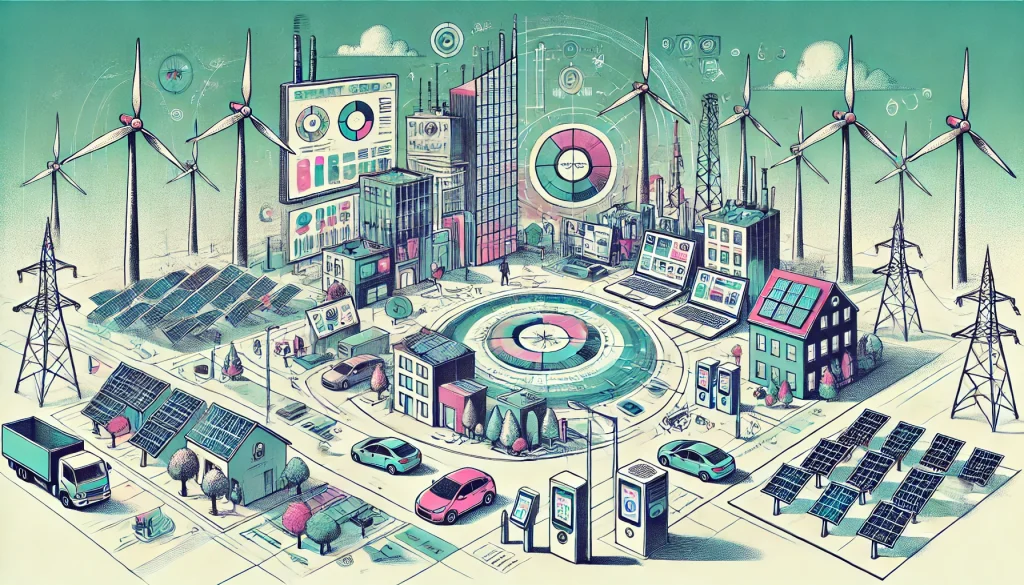
The Rise of Smart Grids: A New Era in Energy Management
In the modern world, where efficiency and sustainability are critical, innovative grid technology is emerging as a cornerstone of the energy sector. Unlike traditional power grids, intelligent grids utilize digital communication technologies to improve the management of electricity delivery. This enhances operational efficiency and reliability by allowing power companies to respond swiftly to changing demands. These grids provide deep insights into power consumption patterns through utilities analytics, enabling utilities to manage supply smarter and more proactively. By analyzing data from smart meters and sensors, utility analytics can detect inefficiencies, predict demand, and optimize resource distribution, further improving energy conservation efforts. This digital transformation signifies a significant shift in energy management. Smart grids enable a more interactive and dynamic power system that enhances efficiency and supports broader sustainability goals by encouraging better integration of renewable energy sources such as wind and solar power.
Essential Components and Technologies in Smart Grids
Examining the technologies and components underpinning intelligent grids is essential to truly understanding them. Smart meters are one of the most visible components, providing consumers with real-time data about their energy use. These devices empower users to adjust their consumption patterns, reducing energy demand.
Furthermore, sensors embedded in the grid infrastructure play a vital role in maintaining the grid’s integrity. They detect fluctuations and irregularities quickly, providing essential data that helps prevent outages and maintain a balanced power supply. Control systems leverage this data to automate processes, reducing the need for manual interventions and allowing for adjustments in real time to optimize grid performance.
Benefits of Embracing Smart Grid Solutions
The move towards intelligent grids comes with a plethora of benefits. They offer enhanced energy efficiency, which translates into lower utility operational costs and reduced consumer electricity bills. The real-time monitoring capabilities facilitate better demand-side management, ensuring that energy is consumed where and when it is most needed, minimizing waste.
Moreover, intelligent grids foster environmental sustainability by supporting a diversified energy portfolio that includes renewables. This reduces fossil fuel dependency, thus reducing greenhouse gas emissions. Additionally, they bolster grid reliability and resilience, which is crucial in mitigating the impacts of natural disasters or unexpected outages.
Challenges in Implementing Smart Grid Technology
Implementing intelligent grid technology has its challenges. One significant barrier is the high cost of upgrading infrastructure and deploying advanced systems. Many utility companies require substantial investment, which can be a deterrent despite the long-term cost savings these systems promise.
Cybersecurity is another pressing concern. Intelligent grids rely heavily on interconnected systems and data transmission, making them susceptible to hacking and other cyber threats. Protecting the grid against these threats is critical to ensuring the integrity and reliability of the power supply.
Overcoming these challenges calls for a coordinated approach involving policy support, industry collaboration, and investment in research and development to foster advancements that can offer cost-effective and secure solutions.
Success Stories: Real-World Applications of Smart Grids
The advantages of smart grid technology are already being felt in several global locations. Large-scale investments in smart grid infrastructure in Europe have resulted in notable decreases in carbon emissions and increases in energy efficiency. Sustainable urban settings have been achieved by integrating intelligent grids with renewable energy sources in cities such as Amsterdam and Copenhagen. State-level initiatives in the US have yielded encouraging outcomes. Regions susceptible to severe weather, like Florida, have seen shorter outages by utilizing intelligent grid-enabled response procedures that enable faster reaction times. These success stories demonstrate how smart grids may significantly increase energy sustainability and resilience.
The Importance of Consumer Engagement in Smart Grid Adoption
Innovative grid technology must be successfully adopted, and this requires consumer participation. Giving customers the resources and information they need to comprehend their usage habits encourages energy-saving actions. Customers who feel more empowered participate in demand response programs more actively, adjusting their energy use to match supply conditions. Utilities can improve the overall efficiency and cost-effectiveness of energy distribution by promoting a culture of informed energy use. This consumer engagement creates a climate conducive to the more significant cultural changes toward sustainable energy usage.
Sustainability and the Green Future of Smart Grids
One cannot emphasize how critical intelligent grids are to advancing sustainability. Smart grids are essential in mitigating climate change because they assist in reducing dependency on fossil fuels by enabling the smooth integration of renewable energy sources. Additionally, by allowing for more diverse and dependable energy sources, this integration lowers the possibility of power outages. Smart grid deployment is inevitable as global legislation increasingly aligns with environmental sustainability goals. With more areas utilizing these intelligent technologies, the road to a future with net-zero energy usage is becoming more evident and attainable.
The Road Ahead: Innovations and Future Trends in Smart Grid Technology
Advancements in sectors like blockchain and artificial intelligence will likely further expand the potential of intelligent grids in the future. Through predictive analytics, AI can increase grid efficiency by identifying possible problems before they happen. Blockchain strengthens the grid’s defenses against cyberattacks by providing increased security and transparency in energy transfers.
Hey, Molar is the voice behind this all-encompassing blog, sharing expert insights and practical advice on business, real estate, and more. Dedicated to helping you navigate the complexities of these fields, Kelly provides the latest trends, in-depth analyses, and creative strategies to elevate your ventures.